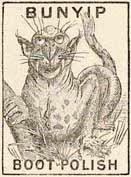THE PUBLISHER Random House, which is no small business, recently issued Anita Heiss' Am I Black Enough For You? As readers will know, the book has been the subject of much comment, but not lately on Random House's web site, where hundreds of critical, but by no means racist, remarks were erased not once but twice. The same thing happened at the ABC, where a comment thread vanished without trace. There were no calls to burn crosses, distribute blankets contaminated with smallpox or remove dusky moppets from their parents' care. The comments were critical of Heiss and that was enough to see them obliterated. This is the sad state of free speech in Australia, and we can only hope that the soon-to-be Abbott government will do something about it.
With this in mind, there is one other thing the next government might wish to examine. Indeed, given the wreck our current PM has made of the nation's finances, one would think it has an obligation to do so without delay.When she sat down to pen her book, Ms Heiss was in receipt of some $90,000 in government grants reserved for Indigenous writers. Had she lacked the requisite melanin to qualify for such support, Heiss would have gone to Random House, pitched her idea and, if it had been accepted, pocketed an advance against future royalties. When the book came on the market, she would not have received another penny until the publisher had recouped its initial investment.
Instead, she and Random House would appear to be making out like bandits. Paid by the taxpayer to write a book about which taxpayers are not allowed to comment, she is now free to pocket royalties from the very first sale. And executives at Random House must be smiling as well. Very little of the company's own cash went into the book's preparation, as its only expenses were printing and distribution. It, too, will be in the black (so to speak) very soon after the release date, regardless of how well or poorly Heiss' book is received.
If this in an inaccurate summation of the way the grants system works, the Professor would like to know. But that is the way it seems from a quick reading of Australia Council charters and wotnots.
So here is a nifty idea for PM Abbott, one that might save the taxpayer just a little bit of cash and improve both the quality and breadth of Australian writing: Instead of simply handing out money in the form of grants, why not underwrite advances to authors? This would mean favoured authors could not double dip -- once on the grant and again on the sales -- and it would also oblige publishers to invest a little more thought to the commercial and literary appeal of projects they take up.
Or think of it this way: You are an acquiring editor and two proposals land on your desk. One is supported by the Australia Council and guarantees a return, regardless of the merit you might see in it. The other is an unsubsidised pitch, one that may well be the worthier of the pair.
Which is likely to get the nod, do you think?
Showing posts with label distorted market. Show all posts
Showing posts with label distorted market. Show all posts
Tuesday, April 17, 2012
Subscribe to:
Posts (Atom)
